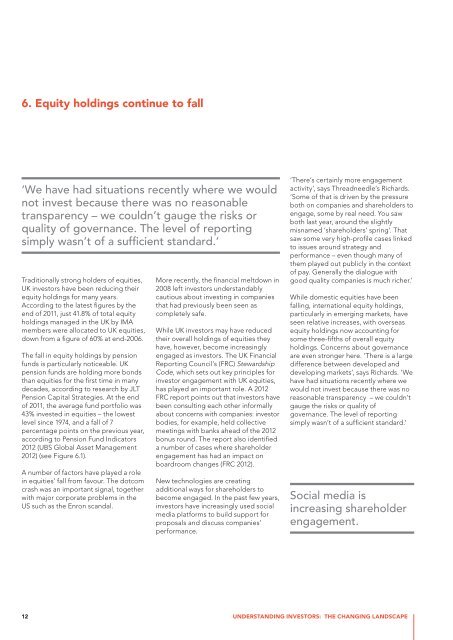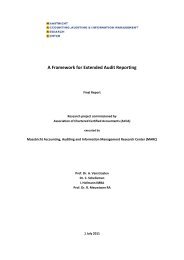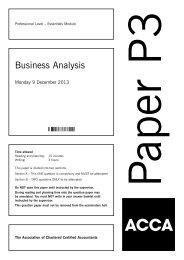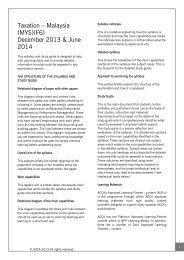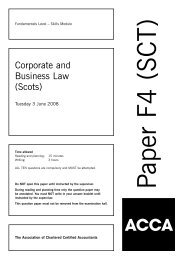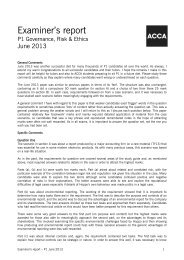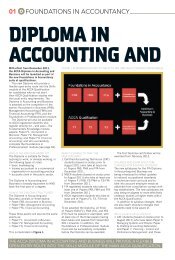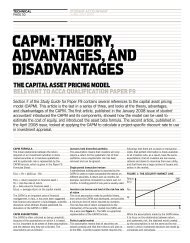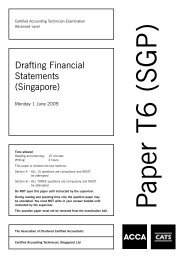Understanding investors: the changing landscape - ACCA
Understanding investors: the changing landscape - ACCA
Understanding investors: the changing landscape - ACCA
Create successful ePaper yourself
Turn your PDF publications into a flip-book with our unique Google optimized e-Paper software.
6. Equity holdings continue to fall<br />
‘We have had situations recently where we would<br />
not invest because <strong>the</strong>re was no reasonable<br />
transparency – we couldn’t gauge <strong>the</strong> risks or<br />
quality of governance. The level of reporting<br />
simply wasn’t of a sufficient standard.’<br />
Traditionally strong holders of equities,<br />
UK <strong>investors</strong> have been reducing <strong>the</strong>ir<br />
equity holdings for many years.<br />
According to <strong>the</strong> latest figures by <strong>the</strong><br />
end of 2011, just 41.8% of total equity<br />
holdings managed in <strong>the</strong> UK by IMA<br />
members were allocated to UK equities,<br />
down from a figure of 60% at end-2006.<br />
The fall in equity holdings by pension<br />
funds is particularly noticeable. UK<br />
pension funds are holding more bonds<br />
than equities for <strong>the</strong> first time in many<br />
decades, according to research by JLT<br />
Pension Capital Strategies. At <strong>the</strong> end<br />
of 2011, <strong>the</strong> average fund portfolio was<br />
43% invested in equities – <strong>the</strong> lowest<br />
level since 1974, and a fall of 7<br />
percentage points on <strong>the</strong> previous year,<br />
according to Pension Fund Indicators<br />
2012 (UBS Global Asset Management<br />
2012) (see Figure 6.1).<br />
A number of factors have played a role<br />
in equities’ fall from favour. The dotcom<br />
crash was an important signal, toge<strong>the</strong>r<br />
with major corporate problems in <strong>the</strong><br />
US such as <strong>the</strong> Enron scandal.<br />
More recently, <strong>the</strong> financial meltdown in<br />
2008 left <strong>investors</strong> understandably<br />
cautious about investing in companies<br />
that had previously been seen as<br />
completely safe.<br />
While UK <strong>investors</strong> may have reduced<br />
<strong>the</strong>ir overall holdings of equities <strong>the</strong>y<br />
have, however, become increasingly<br />
engaged as <strong>investors</strong>. The UK Financial<br />
Reporting Council’s (FRC) Stewardship<br />
Code, which sets out key principles for<br />
investor engagement with UK equities,<br />
has played an important role. A 2012<br />
FRC report points out that <strong>investors</strong> have<br />
been consulting each o<strong>the</strong>r informally<br />
about concerns with companies: investor<br />
bodies, for example, held collective<br />
meetings with banks ahead of <strong>the</strong> 2012<br />
bonus round. The report also identified<br />
a number of cases where shareholder<br />
engagement has had an impact on<br />
boardroom changes (FRC 2012).<br />
New technologies are creating<br />
additional ways for shareholders to<br />
become engaged. In <strong>the</strong> past few years,<br />
<strong>investors</strong> have increasingly used social<br />
media platforms to build support for<br />
proposals and discuss companies’<br />
performance.<br />
‘There’s certainly more engagement<br />
activity’, says Threadneedle’s Richards.<br />
‘Some of that is driven by <strong>the</strong> pressure<br />
both on companies and shareholders to<br />
engage, some by real need. You saw<br />
both last year, around <strong>the</strong> slightly<br />
misnamed ‘shareholders’ spring’. That<br />
saw some very high-profile cases linked<br />
to issues around strategy and<br />
performance – even though many of<br />
<strong>the</strong>m played out publicly in <strong>the</strong> context<br />
of pay. Generally <strong>the</strong> dialogue with<br />
good quality companies is much richer.’<br />
While domestic equities have been<br />
falling, international equity holdings,<br />
particularly in emerging markets, have<br />
seen relative increases, with overseas<br />
equity holdings now accounting for<br />
some three-fifths of overall equity<br />
holdings. Concerns about governance<br />
are even stronger here. ‘There is a large<br />
difference between developed and<br />
developing markets’, says Richards. ‘We<br />
have had situations recently where we<br />
would not invest because <strong>the</strong>re was no<br />
reasonable transparency – we couldn’t<br />
gauge <strong>the</strong> risks or quality of<br />
governance. The level of reporting<br />
simply wasn’t of a sufficient standard.’<br />
Social media is<br />
increasing shareholder<br />
engagement.<br />
12<br />
UNDERSTANDING INVESTORS: THE CHANGING LANDSCAPE


